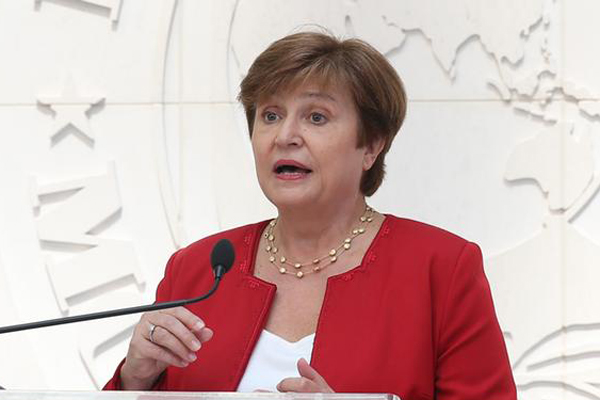Prime
Be transparent and accountable on Covid-19 pandemic funds – IMF

International Monetary Fund head Kristalina Georgieva . Photo/ Xinhua
What you need to know:
- The managing director of IMF Ms Kristalina Georgieva, over the weekend met with African Ministers of Finance and representatives from the United Nations Economic Commission for Africa (UNECA) to discuss Africa’s response to the Covid-19 pandemic and the efforts for a sustainable, green, and inclusive recovery.
The International Monetary Fund (IMF) has asked African governments to be transparent and accountable on the financial resources they are receiving from the institution to help them mitigate the negative impacts of Covid-19 pandemic.
The managing director of IMF Ms Kristalina Georgieva, over the weekend met with African Ministers of Finance and representatives from the United Nations Economic Commission for Africa (UNECA) to discuss Africa’s response to the Covid-19 pandemic and the efforts for a sustainable, green, and inclusive recovery.
After the meeting, Ms Kristalina said financial support to African countries reached an unprecedented SDR 26.2 billion ($36.5 billion), of which low-income countries received SDR 12.8 billion ($17.8 billion), during this period, adding that the IMF has recently boosted its capacity to provide financial support to Africa. It has increased the capacity for concessional financing under the Poverty Reduction and Growth Trust (PRGT).
She said in August 2021, the Board of Governors of the IMF approved the largest SDR allocation in the history of the IMF equivalent to $650 billion (about SDR 456 billion), including about $33 billion to Africa.
“Transparent and accountable use of these resources in the context of medium-term policy frameworks is essential to ensure an effective and sustainable response to the pandemic needs,” Ms Kristalina said, adding: “During our deliberations, discussants stressed that the financing needs of African countries, especially low-income countries, are expected to remain high in the next couple of years, as countries strive to overcome the impact of the pandemic, advance reforms, address climate change adaptation costs, and foster economic recovery.”
In this context, Ms Kristalina explained that the IMF is exploring additional options to help poorer and more vulnerable countries in their recovery efforts and to facilitate more resilient and sustainable growth through potential SDR channeling. This would enable members that have strong external positions to voluntarily re-allocate part of their SDRs to help more vulnerable members.
“The IMF is also enhancing partnerships with other multilateral institutions to help countries support the recovery. In our discussions today, I was greatly encouraged by African policymakers’ strong interest in working with the IMF on SDR 2 channeling to finance longer-term reforms, including to build resilience to climate change and enhance health sector capacity,” she said.
In response to the IMF call, the African Ministers of Finance acknowledged that the unprecedented issuance of $650 billion presents a unique opportunity to improve the fiscal buffers in most countries.
However, based on the current allocation formula, the resources directed to the African continent are incommensurate with their financing needs since African economies are increasingly feeling the crunch of the pandemic on public finances.
Reiterating their commitment to domestic policy reforms in order to optimize resource use and strengthen the social contract between government and citizens, the Ministers of Finance equally highlighted the following priorities in reviewing the global financial architecture to ensure the efficacy of the recovery:
Innovative sustainable finance mechanisms: The African ministers expressed concern that previous promises of mobilising the $100 billion promises had not been achieved and called for more financial innovations to facilitate access to critical resources needed to invest in a green recovery.
On-lend SDRs to low and vulnerable middle-income countries through the Poverty Reduction and Growth Trust: they called for at least 25%-30% of $650 billion SDRs to be on-lent to support low and vulnerable middle-income countries. “On-lent SDRs should support vaccine access, fund the IMF’s Poverty Reduction and Growth Trust which serves all low-income countries,” they said.
“Improve access to vaccines: Establish an SDR funded Vaccine Acquisition Facility to urgently address the rising global vaccine inequity. Support efforts to establish regional vaccine manufacturing hubs to ensure sustainable supplies particularly for high-risk groups,” they asked the IMF among other requests they presented to the IMF during their discussion.



